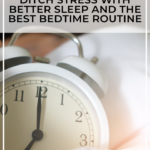Healthy Sleep!
.jpg)
I hear it from my clients, friends, and family – it’s like an EPIDEMIC. We are all having a hard time falling asleep and staying asleep.
The bad news is…lack of sleep causes you to feel lousy. It creates hormonal imbalances and can cause heart disease, along with a host of other health problems.
And, how well you’re sleeping is linked to your nutrition and health. Research tells us that not getting enough sleep can lead to weight gain and obesity.
The good news is…if you improve your sleep hygiene, the negative impacts of lack of sleep will reverse!
That means improved immunity, weight, diet, mood, and more. (Sleep hygiene is basically how the cool kids are describing your habits to help optimize your quality and length of sleep.)
The funny thing is, you might not even realize you’re not getting enough sleep. If you’ve trained your body to run on a low amount of sleep, you might feel totally “normal” — even though your body is craving more rest time (but I’m going to guess you probably would tell me, “Yes, Mel, I could really go for another hour of sleep every night”).
Let’s assess your sleep hygiene.
Answer these questions from one of my fave sleep quizzes (compliments of Dr. Megan Rossi) thinking about the past month of your sleep habits…
- What is your usual bedtime & getting-up time?
- How many hours of actual sleep do you get? (This is less than actual time spent in bed.)
- How long does it usually take you to fall asleep?
- Thinking about your quality of sleep, is it very good or very bad (or somewhere in between)?
- Do you ever take medication (over the counter or prescribed) to help you fall asleep?
- How often have you had any trouble staying awake while…driving, eating, working, or engaging in a social activity? (Never, often, or somewhere in between?)
If any of these questions bring up a possible “red flag” about your sleep, you are NOT ALONE.
Here are 4 factors you should look at that may affect sleep:
- How much caffeine are you having every day? What time are you consuming it? Can you cut it down and/or limit it to only the morning?
- Are you a smoker? This has an influence on your sleep, big time. (I don’t need to get into all the other health problems cigarettes can cause because I know you know them.)
- Electronic media exposure, and
- How much bright light you’re exposed to as you get close to your bedtime.
Let me tell you how you can make some little, healthy changes in your evening routine to help you get a great night’s sleep. The changes are technically easy, but it will require you to shift how you look at your night. It might mean changing what your “me time” looks and feels like.
But my promise to you is, if you get more sleep you will absolutely start to feel better every day.
How much sleep do you need? Ideally, 9 hours. But at a minimum, adults 18+ should be getting at least 7 hours of good sleep each night (not counting the time it takes to fall asleep). Your kids should be getting anywhere from 12 (toddlers) to 10 (teens) hours a night.
Mel, how do I make this happen when I don’t have enough time as it is?
First I want to talk about the bedtime routine. If you have zero routine, this is the first, most important step for healthy sleep: get a bedtime routine.
Build a Bedtime Routine for Healthy Sleep
Jot down the things you need and want to do before bedtime. It might be watching your fave show, skincare (face washing, lotion, etc.), reading a book, 5 minutes of meditation, a 10-minute yoga stretch, catching up with your spouse, prepping for the morning (breakfast, lunch, outfit, etc.), drinking a cup of tea, whatever. Then, think about how much time it realistically takes to do these things. Backtrack from your ideal bedtime (considering you want to get at least 7 hours), and implement!
Then, nix the electronics (phone, TV, laptop, etc.) 30-60 minutes before bed, OR if that’s your only time to get your electronic fix, invest in a pair of cheap blue light blocking glasses (need a recommendation? Here’s my fave pair off Amazon).
Also, be sure to decrease how much lighting there is in the room where you’re starting to get ready for bed. If you’re not watching TV, turn it off. Dim the lights or use a book light to read. If you’re in the tub, consider lighting a couple of candles. The dimmer, the better. The darker it is, the more your body will produce sleep-inducing melatonin. (On the flip side, staring at your phone or the TV tells your body NOT to produce melatonin.)
Try doing this consistently for an entire week and see how you feel. Tag me this week on social media to share your favorite nighttime routine wind-down activities!
*Note: I often use affiliate links in my post, but only recommend brands I use personally.
References:
Rossi, Megan MD. (2006) Eat Yourself Healthy – An Easy-to-Digest Guide to Health and Happiness from the Inside Out (pp. 161-165).
Golem, D. Martin-Biggers, J. Koenings, M. Davis, K. Byrd-Bredbenner, C. “An Integrative Review of Sleep for Nutrition Professionals.” Journal of Advances in Nutrition. 2014. Accessed 02-24-20 via https://www.ncbi.nlm.nih.gov/pmc/articles/PMC4224209/.















